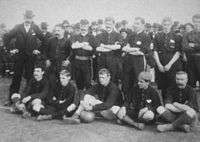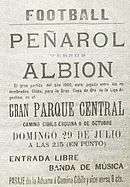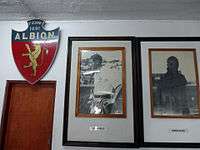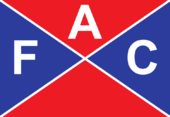Albion F.C.
Albion Football Club is a Uruguayan football club, located in Montevideo. The club, founded in 1891, is the oldest football club in Uruguay and currently plays at Uruguayan Segunda División, the second division of the Uruguayan Football Association league system.
 | |||
| Full name | Albion Football Club | ||
|---|---|---|---|
| Nickname(s) | Decano, The lions | ||
| Founded | 1 June 1891 | ||
| Ground | Parque Dr. Enrique Falco Lichtemberger, Montevideo, Uruguay | ||
| Capacity | 2.000[1] | ||
| Chairman | Leonardo Blanco | ||
| Manager | Gabriel Corral | ||
| League | Segunda División | ||
| 2019 | Segunda División, 9th | ||
|
| |||
It is considered the oldest football club in Uruguay because other institutions such as Montevideo Rowing Club and Montevideo Cricket Club had been founded before but they were not specifically dedicated to football.[2]
In July 2018, Albion became a member of the exclusive Club of Pioneers.
History
Foundation




Albion was established on 1 June 1891 as Football Association by students of the English High School, mainly encouraged by Henry Lichtenberger, an 18-year-old disciple of William Leslie Poole, considered the "father" of Uruguayan football. During its first years of existence, the club refused to accept non-native players although most of its footballers were British descendants but born in Uruguay. The first uniform was a white jersey with a red star on the chest.
Development
Football Association's first match was on 2 August 1891 against Montevideo Cricket Club, where was defeated by 3-1. The second match versus the same rival FA was defeated again by 6-0. On 21 September 1891 the club changed its name to "Albion Football Club" as an homage to the country where football had been played by first time so "Albion" was the name used by Ancient Greeks to refer to Great Britain. The uniform was subsequently modified, as a result the club adopted a blue jersey with white collar.
The popularity of football increased between 1892 and 1895 amongst the Uruguayan people. In 1892 there were four clubs practising football: Montevideo Cricket, Montevideo Rowing, Central Uruguay Railway Cricket Club (mostly known as "CURCC") and Albion. Montevideo CC was the most successful of them, finishing unbeaten with some remarkable results such as an 8-0 over CURCC and a 10-0 over Albion.
On March 21, 1895, Lichtenberger himself suggested to modify the rules to allow foreign players to play at Albion. Other changes were introduced such as the replacement of the jersey so red and blue colors were adopted as a tribute to the flag of Great Britain. At the same time, Montevideo Cricket and Montevideo Rowing left the practise of football, at least at competitive levels to focus on other activities.
The golden age: 1895-1900
Albion became the main club football in Uruguay, being the first team from that country to win outside Uruguay: in 1896 Albion defeated Argentine teams Retiro Athletic Club and Belgrano AC (4-1 and 5-3 respectively), both matches played in Buenos Aires. It is believed that the first international games played in Uruguay were in Punta Carretas, where Albion faced Lobos AC, an Argentine team that played in Primera División until the Argentine Football Association disaffiliated it.
The first Uruguayan derby was between Albion and CURCC. The CURCC had been founded in 1891 as a cricket club, having added football just one year after its establishment. The first game both teams faced each other was on May 25, 1892, being CURCC the winner by 5-0. CURCC won the most games played between both teams until 1897, when started an extraordinary series of 14 consecutive wins over CURCC. From 1896 to 1899 other football clubs were established, Deutscher Fussball Klub, Uruguay Athletic Club and Club Nacional de Football.
The first league
Albion was one of the four founding members of the "Uruguay Association Foot-ball League" (current Uruguayan Football Association). The first championship was disputed in 1900, where Albion finished second to CURCC. By those times, some players left the club: Ernesto Caprario, Carlos Carve Urioste and Domingo Prat that moved to Uruguay Athletic. Other players that left the institution were Céspedes brothers, Cuadra, Reyes, Castro, Bouton and Nebel, who later founded the Club Nacional de Football.
In 1901 Albion played a match against an Argentine League combined team, which is considered the first official Uruguay national team match in the history.[3] Nevertheless, that game is not considered official and the media referred to the team as Albion FC instead the Uruguay national team. The team was formed by 9 players from Albion and 2 from Nacional who had been played for the club before the exodus.
Decline and refoundation
On March 22, 1901, Nacional requested the Association to enter the league, being accepted by the body. Nacional and CURCC were the most popular teams by then. Albion would make poor performances during the successive seasons, being its worst campaign the 1905 tournament where the team finished with no points. In 1908 the club played its last season in Primera División.
In 1914 Albion was one of the teams founding the "Liga Universitaria de Deportes", taking part with a team named "William Poole". By 1931 Albion played in minor leagues, the same during the 1940s.
On June 1, 1953, Albion won the "Torneo Preparación" championship, taking also part of the Federación Uruguaya de Fútbol Amateur, winning the 1953 and 1954 titles. The club was also a founder of Uruguayan baseball league, having competitive basketball and athletics teams. In 1976 Albion merged with Club Sportivo Miramar changing its name to "Albion Miramar", but this only lasted one year.[4]
Since then, Albion has played the third division tournaments, being nowadays the oldest Uruguayan football club still active.
Uniform evolution
1891 |
1891-95 |
1895-present |
Titles
- 1900
- Segunda División B Nacional: 1
- 2017
References
- Estadios de Uruguay: Parque Dr. Enrique Falco Lichtemberger
- "Historia del fútbol uruguayo" at Deportes en Uruguay website
- Argentine national team - List of other matches 1901-2008 at RSSSF
- "Historia del Albion by Juan Carlos Luzuriaga at club's official website". Archived from the original on 2012-06-22. Retrieved 2012-09-21.
External links
| Wikimedia Commons has media related to Albion Football Club. |